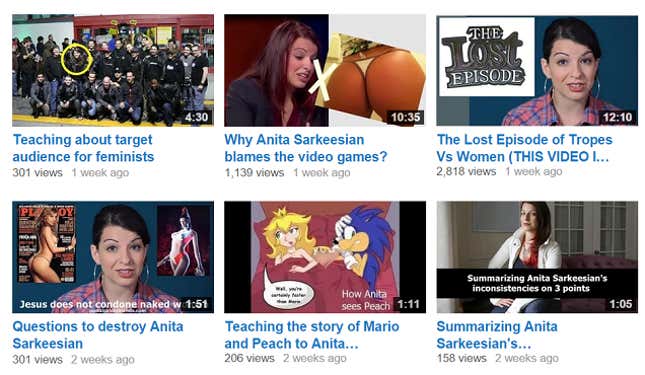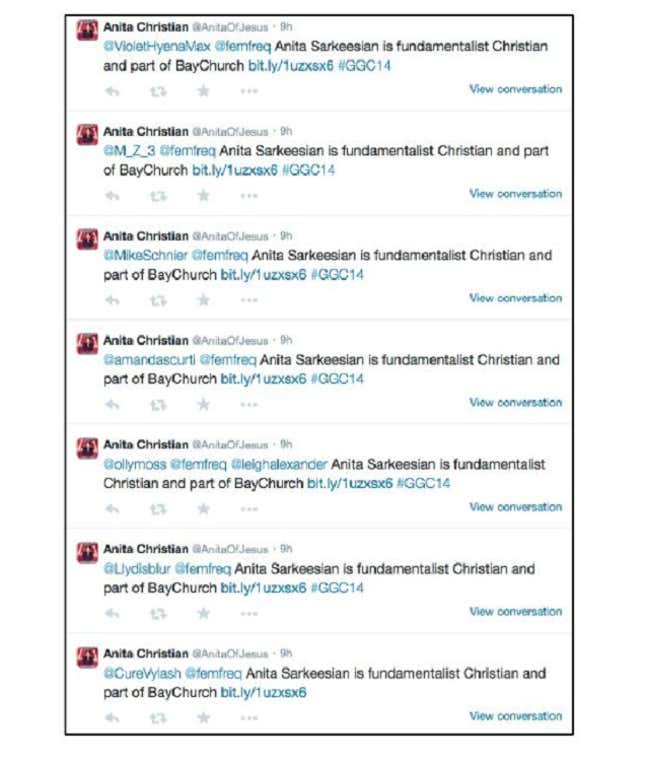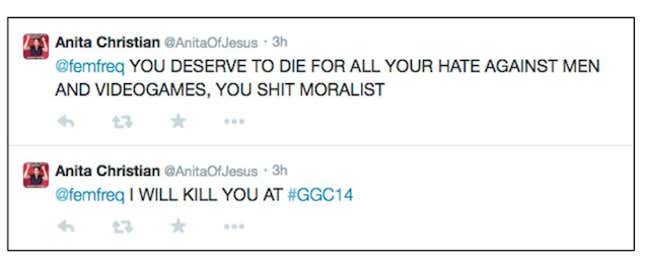In mid-October, I was approached by some Gamergaters who wanted to show me something important. They had bagged a big one, they said. They said they had tracked down one of the people who was sending death threats to feminist critic Anita Sarkeesian.
I didn't know how to react. Members of Gamergate—an amorphous campaign that has been going on for months now—had themselves long been accused of harassing and doxxing outspoken critics including game developer Brianna Wu and actress Felicia Day. Though many Gamergate supporters had publicly denounced that sort of activity, the movement's anonymity and lack of leadership has made it impossible to hold the entity called "Gamergate" accountable for anything. Anyone in the world can declare themselves part of Gamergate. As mainstream media from the Wall Street Journal to Rolling Stone drew links between Gamergate and death threats, the movement's outspoken supporters complained that they were being misrepresented, and that in fact they denounced all forms of harassment. But those who have been harassed see the campaign as the culprit—when Sarkeesian cancelled a planned university speech following a terror threat, she pinned the blame on Gamergate.
By offering up the person they said was a Sarkeesian harasser—and subsequently pointing out the good deed to me and other reporters—these Gamergaters who contacted me were hoping to prove that they were indeed against this kind of activity. In and of itself that's not a difficult claim to make—what sane person would ever proclaim themselves in favor of death threats?—but these people seemed particularly interested in clearing Gamergate's name. "Look," they wanted the world to know. "It's not us."
I was skeptical, but the nugget of a potential story stuck with me, and I decided to start really looking into the man who was accused of these things. In the days that followed, both through interactions with that man and other reporting, I would get something of a glimpse into the mind of someone obsessed, someone who seems to have made dozens of videos and numerous Twitter accounts all for the purpose of demonizing Anita Sarkeesian.
This is a man who appears to have created a handful of fake YouTube accounts to comment on his own videos with messages like "GREAT, ANITA IS A LIAR."
This is a man who told me that he doesn't want to hurt Sarkeesian, but that he "would not be sorry" if "a ghetto girl fan of GTA [met] her on the street, and [gave] her a nice punch in the face."
This is a man who, in a video posted on YouTube just a few days ago, took off his pants and air-humped toward a picture of Sarkeesian, saying "suck my dick, bitch… suck my dick, bitch."
Meet Mateus Prado Sousa, a man whose harassment of Anita Sarkeesian appears to continue to this day, through some of the world's most popular online platforms.

In September of 2013, someone named Celebrinando_Mateus wrote a comment on gaming site IGN. "About GTA V GameSpot review," that commenter wrote, "The reviewer is a transex. He/She call the game Misogynistic… GTA is a satire. Dark humor! It is sarcastic… I will never read GameSpot again."
Linked on the bottom of the comment was a Twitter handle, @gamesreflexoes. Don't bother trying to look it up—it's suspended, just like dozens if not hundreds of other Twitter accounts that have been linked to Mateus Prado Sousa, who apparently lives in Rio de Janeiro, Brazil and writes for a website called Celebrinando.
Sousa first came to the attention of several writers in gaming when websites published their reviews of Grand Theft Auto V late last year. During that week, Sousa took to Twitter and e-mail to voice passionate opinions about the reviews he didn't like, specifically targeting those who criticized GTA's depiction of women, like GameSpot reviewer Carolyn Petit and game critic Leigh Alexander (a friend of Kotaku who occasionally writes columns for us). When I asked Alexander if she was familiar with Sousa, she said he had been spamming comments on her public Facebook account for ages.
"He had a high amount of activity towards me around the release of GTA V," Alexander said, showing me an e-mail that Sousa sent her last year, in response to a satirical review she wrote about Rockstar's open-world game:
You call GTA V Misogynistic. In a game where killing is normal, sexism is nothing, this is a dark humor game after all. Based on male crime vision. GTA is a satire, dark humor! It is sarcastic. The irony is the point of radio station of gta v. Sorry, you should work for Human Rights or some feminist group instead. For you GTA is a celebration of killing too?? Or a celebration of human traffic, because in GTA 4 they sell babies in a box. GTA is all about bizarre things, it so bad that you, a game journalist dont know that. Murdering, Stealing, Drugs, but misogyny is the problem?
This sort of rhetoric—a common response to progressive critiques of video games—actually echoes the opinions of many Gamergate supporters who have spoken out against the inclusion of feminist criticism in game reviews. But Sousa's GTA V crusade happened a year before Gamergate even started. In fact, this sort of sentiment has been floating around gaming culture for years now. And it's not a shock to see Sousa sympathizing with this newly-formed campaign. "I'm not part of GamerGate movement, despite agreeing with it," he wrote in a blog post last month.
These days, Sousa has a new target: Anita Sarkeesian. His YouTube channel—which he promotes excessively—is full of videos with titles like "Questions to destroy Anita Sarkeesian" and "Anita Sarkeesian Unmasked." He has a thick accent, making much of his English difficult to understand, but his point is always the same: Sarkeesian's criticism of the depiction of women in games like GTA and Assassin's Creed is wrong.

Most of Sousa's videos focus on Sarkeesian's arguments—"Anita confuses being sexy with being sexist, and one thing has no relation to the other," he writes—but they often delve into personal insults, and some cross the line into full-on repulsiveness. In one of his most recent videos, titled "I HATE ANITA SARKEESIAN - Stand Up Comedy," Sousa takes off his pants and starts thrusting his pelvis at a screenshot of Sarkeesian's face, repeating "Suck my dick, bitch." Later, he begins addressing Sarkeesian directly: "Fuck you! Fuck you!"
Most members of Gamergate don't like Anita Sarkeesian, either. But they might dislike Sousa even more. Searching his name in conjunction with the infamous hashtag reveals nothing but people deriding and condemning him, and several Gamergaters have taken credit for drawing lines between Sousa and a few now-suspended Twitter accounts that sent unambiguous death threats to Sarkeesian last month.
Sousa, however, denies that he was behind those accounts: "They are my fans and followers," he told me in an e-mail two weeks ago. And in a blog post on October 24, he wrote: "I was accused by some members of the #GamerGate movement, of having threatened feminist Anita Sarkeesian on Twitter, but this is not true."
So now we're in murky territory. Did Mateus Prado Sousa send death threats to Anita Sarkeesian? Just how far does this obsession go? Let's take a step back and go over some facts.
1. Over the past few weeks, dozens of Twitter accounts have continuously flooded people with messages about Anita Sarkeesian as well as links to Sousa's YouTube channel. All of these accounts have followed similar patterns, often using handles in Portuguese and variations on the word Celebrinando. Almost all of these accounts have been suspended by Twitter.
Here's an example of what that has looked like (hit Expand in the top-left corner to make the text larger):

2. It's unclear whether these accounts are all the work of Sousa, but in an e-mail to me, Sousa took responsibility for a few that followed the same pattern: @CelebrinandoPor and @CelebrinandoRJ. Both of those accounts have also been suspended. To this day, as Sousa continues publishing videos, brand new Twitter accounts continue to pop up and follow this same routine, sending the same links and messages to as many people as possible.
There appears to be nothing anyone can do about this—though Twitter's security team will suspend each account after enough people report it, the flood of new accounts seems to never end.
3. Twitter isn't the only place you can find fake accounts linked to Sousa—many of the comments on his YouTube videos about Sarkeesian are from what also appear to be dummy handles.
For example, under the video "Anita Sarkeesian Unmasked" there are comments like this:

The top account, Ana banana, links to the YouTube handle mateusapresentando4. The second, Tyuii Dswe, links to the YouTube handle mateusapresentando3. The third, Catie Hjj, links to the YouTube handle mateusapresentando5. All three accounts—along with a fourth, named, of course, mateusapresentando2—have Liked and commented on many of Sousa's videos. Again, there's no way to know whether this is all the work of one person or if it is a group, but the patterns are consistent and clear.
4. On October 11, a number of Twitter accounts with handles containing the word "Anita" started popping up. They followed that same video-flooding pattern. One example: an account named @AnitaOfJesus that repeated the same messages as Sousa's @CelebrinandoRJ.

5. That same account—@AnitaOfJesus—also sent the following messages to Sarkeesian:

#GGC14 is a reference to Geek Girl Con, where Sarkeesian was speaking that weekend. Earlier that day, she had tweeted about a flood of slandering messages from one of Sousa's accounts—CelebrinandoRJ—which led Twitter to suspend it. Right after that, the death threats began.
Yet… though @CelebrinandoRJ and @AnitaOfJesus tweeted the same exact messages, Sousa denies that he's responsible for the latter. He says it—along with the other, similar Twitter accounts that also sent death threats to Sarkeesian—was created by his fans.
"I don't know the true identity of them. I just know they are just trolls, they are having fun at the expense of the GG people," Sousa told me in an e-mail. "TROLL death threats, it is not real, any idiot would notice that seeing the messages they were posting. And they did it because Anita was the reason my account was banned."
Many of Sousa's recent actions have been publicized and brought to people's attention by two Gamergate supporters, who both say they have incontrovertible proof that the man behind all of those videos is indeed one of the people who said he would kill Anita Sarkeesian. One of those Gamergaters, who goes by the Twitter handle @brofreq—a reference to Sarkeesian's own Twitter account, femfreq—said they used a phishing link to snag the IPs of both AnitaOfJesus and Sousa's personal e-mail account, and that the addresses matched. (He showed me the IPs he said he took, which did indeed match—though in the era of Photoshop, that's hardly irrefutable evidence.)
The other Gamergate supporter, who goes by the Twitter handle @sanc, called Sousa a "sad sociopath." When I asked sanc on Twitter if we could talk about what had happened, he sent me a nice note explaining why he joined Gamergate and emphasizing that he and others in the campaign have continually reported Sousa to Twitter and to the police, despite their own public distaste for Sarkeesian.
"He has been relentlessly seeking [attention], and we tire whenever we see him, actively trying to shut him down as soon as possible and report him to authorities, as we do with other offenders," sanc said.
For some it might be tough to reconcile the idea of anyone condemning harassment while simultaneously supporting Gamergate, but it's something I've experienced personally. When one particularly terrible person attempted to "dox" several Kotaku writers and other reporters by posting lists of addresses and phone numbers, I browsed through the hashtag on Twitter and saw Gamergate supporters rallying to report the doxxers to Twitter. (The doxxers also used the hashtag #Gamergate, though they went after moderators of the Gamergate subreddit Kotaku In Action, too.)
Yet at the same time, some Gamergaters have used Twitter to facilitate a culture of fear, where speaking out against the hashtag or even just drawing their attention can lead to a flood of unwanted attention and notifications. For anyone in gaming who uses Twitter to network, promote their work, and interact with friends, it can be exhausting and demoralizing to find oneself on the receiving end of what has become Twitter's Eye of Sauron.
It really can be a draining experience. I've been through it, as have many of Kotaku's staff over the past few months. Many people under the Gamergate banner will draw the line at death threats, but are more than okay with pulling their targets—such as Sarkeesian—into endless strings of 140-character insults and meme-like images designed to excoriate those who draw Gamergate's ire.
When I first reached out to the Gamergate supporter @brofreq, one of his first questions was whether or not I had spoken to Sarkeesian. He wanted me to know that many Gamergaters have contacted her on Twitter about Sousa, yet she hasn't publicly addressed them. Like some others in the campaign, he was disconcerted that Sarkeesian wouldn't acknowledge what they saw as a coordinated effort to help her out.
"I know she had his [CelebrinandoRJ] account suspended the morning he started this campaign against her, but she hasn't responded to our various messages letting her know that we know who it is," brofreq said. "I have not seen her officially acknowledge this as a threat towards her."
But Sarkeesian is aware of Sousa—in fact, she says she's known about him since well before he landed on Gamergate's radar.
"I have been aware of this individual's activities and identity since he started harassing GameSpot over their GTA V review last year," Sarkeesian told me in an e-mail earlier this month. "I reported his accounts to Twitter and to the authorities as soon as he began spamming specific threats at me on social media in September."
Besides, it'd be hard to imagine Sarkeesian ever praising the Gamergate campaign for anything. On October 14, three days after @AnitaOfJesus's death threat, Sarkeesian cancelled a planned speech at Utah State University because of yet another a terror threat that had targeted her. She pointed a finger toward Gamergate, publicly emphasizing that the movement includes some of those who have done vile things to her in the past, like the man who in 2012 made a flash game called Beat Up Anita Sarkeesian. "This is a war on women in gaming waged by a group of sexist monsters," Sarkeesian tweeted on October 22. "If you are not a horrible human being, get out of #gamergate now."
Of course, supporters of the movement weren't pleased by that description. Some of them pointed out that, hey, they were helping fight harassment by reporting people like Sousa—people who took things too far. But at the same time, even a cursory search for Sarkeesian's name on Twitter and some other Gamergate-heavy forums is enough to find plenty of angry messages, offensive caricatures, and inflammatory comments.
It does all raise the question: how much influence has the atmosphere of Gamergate had over someone like Sousa? Death threats on the Internet have existed since mankind figured out that computers could connect to one another, and Sousa has been waging his war against feminist critics for over a year now, but it's not exactly preposterous to suggest that these recent events might have egged him on. After all, many of Sousa's tweets and videos have included the Gamergate hashtag, even if many in the movement would like to see him go straight to a Brazilian prison.
"Gamergate seems to have ratcheted up his obsession with [Sarkeesian]," said Alexander, who herself has been the target of Gamergate's ire as a result of a Gamasutra article she wrote that harshly criticized gaming's consumer culture. "Or with insisting games are for men."

Over the past few weeks, I've spent a great deal of time trying to understand Mateus Prado Sousa. It's been difficult, to say the least. When I first reached out to him by e-mail, he asked for a link to my Twitter account, and he told me to follow one of his accounts to talk more. So I did. Then, over Twitter direct messages, I asked him if he was behind the accounts that had sent death threats to Anita Sarkeesian.
"I will contact you by email now," he said.
As we talked further, Sousa continued to deny sending death threats to Sarkeesian, though he did have some harsh words for the popular critic: "To me, she is a criminal, and should at least be arrested for many lies she says, instead of containing her speech on the real feminist discourse, true, that seeks to increase the space of women in society, but without resorting to sensationalism and wickedness. Everyone is entitled to opinions, but dishonesty must be punished."
I asked what he meant by that.
"I don't know, maybe a ghetto girl fan of GTA, meet her on the street, and give her a nice punch in the face!" Sousa said. "I don't encourage it, but I certainly would not be sorry for Anita. Dishonest, deceitful and perfidious people like her, ask to be abused in one way or another."
"Really?" I asked. "You think she should be harmed?"
"I did not say she should get punched in the face," he said, "but for sure I would not be sorry for her, I can assure you."
Eventually, Sousa got sick of my questions, and started responding to my e-mails with links to his videos and the following message:
I have no interest in clarifying anything, like Anita, I like controversy, it helps promote my work. Do not waste your time sending me more questions, as they will not be answered. If you do not want problems with me, send me any links to any articles you quote me. Will be best for you. Think what you want about me, dear. At most you'll be spreading my website for the world and I am grateful. Just be careful when publishing false information about me, because I do not know about your financial condition, but I have a lot of money and good lawyers, and I would not hesitate to sue Kotaku for libel.
So here we are. Is Sousa the person who sent death threats to Sarkeesian, or just an obsessive video-maker? Is he working by himself? With a group of fans? Just why does he hate Anita Sarkeesian so much? Does he just want attention? Should we pity him? Why is he doing this?
I'm not sure we'll ever have straight answers to those questions, but one thing has become as clear as can be: platforms and websites such as Twitter and YouTube have made it significantly easier for some people to bring misery to the lives of others. When a person seemingly wants to create endless accounts for the sole purpose of targeting someone—and when that person lives in Brazil, far away from U.S. law enforcement—what is there for the victim to do? For Anita Sarkeesian, this isn't an anomaly—it's just one example of the type of obsessive person who has repeatedly criticized and castigated her since she first launched her Kickstarter campaign two years ago. Short of shedding social media entirely—an unfeasible option for professionals in media—how can anyone fight against this?
While reporting on this story, I reached out to representatives for Twitter and YouTube, but neither responded to my requests for comment. Last week, Twitter announced a partnership with a non-profit group called Women, Action, and the Media to expedite the harassment reporting process, but filling out their forms is time-consuming and exhausting, especially when you know that for every account Twitter suspends, the offending person or group of people can just make ten more.
Perhaps worst of all, Twitter places the onus of reporting on the victims. In this case, the lines of defense against harassment are A) Sarkeesian and B) whatever other activists decide to step in. Instead of Twitter or the police patrolling and reporting the actions of people like Sousa, the job has fallen to the targets themselves, aided in some cases by a most unlikely watchdog: Gamergaters.
Twitter accounts linked to Sousa continue to pop up every day. His videos appear to be getting increasingly repulsive. People just keep reporting him. What else can they do?
Top illustration by Jim Cooke.

